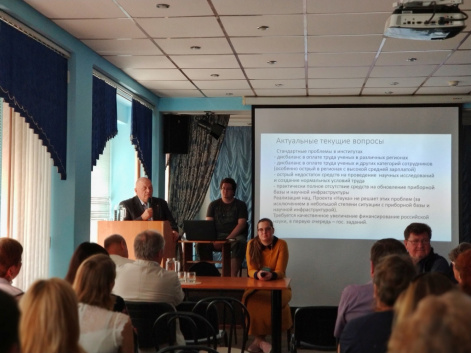All-Russian Assembly of the Labour Union of the Russian Academy of Sciences was held at the Krasnoyarsk Science Center
22 August 2019 г. FRC KSC SB RAS

The All-Russian (Siberian-Volga) Assembly of the RAS Labour Union has been held for the twenty-fourth time. It is for the first time that Krasnoyarsk has hosted the Assembly, Krasnoyarsk Science Center SB RAS being one of its main organizers. The Assembly was a record in the number of reports; there were more than forty of them. The event was attended by almost a hundred people fr om 14 regions of the country, including Novosibirsk, St. Petersburg, Saratov, Ulan-Ude, Nizhny Novgorod, Tomsk, Irkutsk, Moscow and Kazan.
At the assembly the participants discussed the problems of labor relations and the wage system, the state assignment and its distribution among scientific institutes, young scientists and specialists. The labour unions paid special attention to the imbalance in the remuneration of scientists in different regions, the instability of the flow of funds to research centers and the lack of information on their volume and allocation rules.
However, the main topic was the financing of scientific institutions. Paradoxically, the lack of funds for research, maintenance of research institutions and creation of normal working conditions is largely the result of fulfilling the requirements of Presidential Decree No. 597. The order is aimed at increasing the average salary for researchers to 200% of the average salary in the region. It sounds great, but there are problems in implementation. With a decline in government expenditures on science at academic institutions, the wage growth has to be created “artificially” by transferring employees to part-time working contracts, or using resources planned for other purposes. As a result, the institutes have almost no money for updating the equipment and scientific infrastructure. To solve the indicated problems, it is necessary to increase funding for Russian science or to correct some points in this decree.
Moreover, since 2012 research institutes have been switched from estimated budgetary funding to remuneration of employees according to state assignments. Nikolai Chesnokov, Deputy Director of the Federal Research Center KRC SB RAS, comments on the situation: “The state assignment involves financing only certain types of work. The entire area of the Akademgorodok, including its residential sector, is serviced by the Krasnoyarsk Science Center. Here, in addition to performing the main function of conducting research, it is necessary to spend efforts and finances on maintaining the infrastructure. The state assignment does not provide financing for such things. Before we used to have separate budget sectors for services, major repairs, etc., now it has become difficult. And these issues of the infrastructure maintenance remain unsolved.”
Next to the finance problem is another one - ranking of research institutes in three categories and rating distribution of funds. The first category should include the best institutions, to be financed and provided with new equipment in priority order. But the institutions of the second and third categories hardly receive any support. So far, no actions have been taken in this direction and it is not clear what fate awaits them. In addition, at present we are already face with a situation wh ere there are not enough funds for all the institutions of the first category; thus, the leading ones are selected from among them, which further aggravates the issue.
“Now we can observe the following situation: in order to increase the financial support for one institution, it is necessary to take something from another. The institutions of the second and third categories are infringed in some positions, for example, in the distribution of money for equipment and extensive repairs. Due to lack of funds, there will always be problems with salaries, to entail a rapid reduction in scientific potential since there will be no influx of perspective young scientists and equipment, ” says Viktor Kalinushkin, chairman of the RAS labor union.
As far as this issue is concerned, the union decided to contact the Ministry of Science and Education of the Russian Federation directly with the question of how institutions of the second and third categories will live and develop. “The vast majority of key problems can be solved in only one way - a substantial increase in funding for Russian science. Fortunately, the issue of financing is already not a question of life and death for scientific institutions, but of further development and ensuring normal functioning, ” says Victor Kalinushkin. At the same time, there will be no increase in financial support if no well-thought-out, well-reasoned requirements with calculations to increase a particular expense column are received in the Ministry of Finance.
In this regard, the union came to a decision to continue working with the Ministry of Education and Science as well as Government of the Russian Federation in order to increase financing and adjust the rules for allocating the funds and amount of state assignments among institutions, and to introduce monitoring of the situation in institutions and research groups.
Share:
